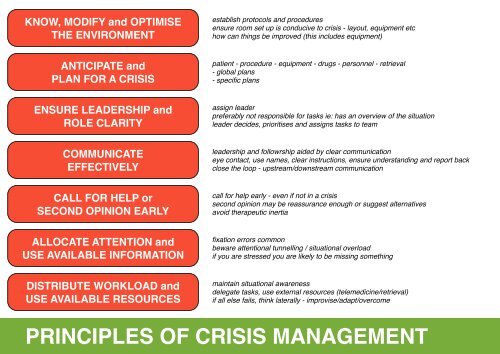Theatre Checklists
Theatre Checklists
Theatre Checklists
You also want an ePaper? Increase the reach of your titles
YUMPU automatically turns print PDFs into web optimized ePapers that Google loves.
KNOW, MODIFY and OPTIMISE<br />
THE ENVIRONMENT<br />
ANTICIPATE and<br />
PLAN FOR A CRISIS<br />
ENSURE LEADERSHIP and<br />
ROLE CLARITY<br />
COMMUNICATE<br />
EFFECTIVELY<br />
CALL FOR HELP or<br />
SECOND OPINION EARLY<br />
ALLOCATE ATTENTION and<br />
USE AVAILABLE INFORMATION<br />
DISTRIBUTE WORKLOAD and<br />
USE AVAILABLE RESOURCES<br />
establish protocols and procedures<br />
ensure room set up is conducive to crisis - layout, equipment etc<br />
how can things be improved (this includes equipment)<br />
patient - procedure - equipment - drugs - personnel - retrieval<br />
- global plans<br />
- specific plans<br />
assign leader<br />
preferably not responsible for tasks ie: has an overview of the situation<br />
leader decides, prioritises and assigns tasks to team<br />
leadership and followrship aided by clear communication<br />
eye contact, use names, clear instructions, ensure understanding and report back<br />
close the loop - upstream/downstream communication<br />
call for help early - even if not in a crisis<br />
second opinion may be reassurance enough or suggest alternatives<br />
avoid therapeutic inertia<br />
fixation errors common<br />
beware attentional tunnelling / situational overload<br />
if you are stressed you are likely to be missing something<br />
maintain situational awareness<br />
delegate tasks, use external resources (telemedicine/retrieval)<br />
if all else fails, think laterally - improvise/adapt/overcome<br />
PRINCIPLES OF CRISIS MANAGEMENT


